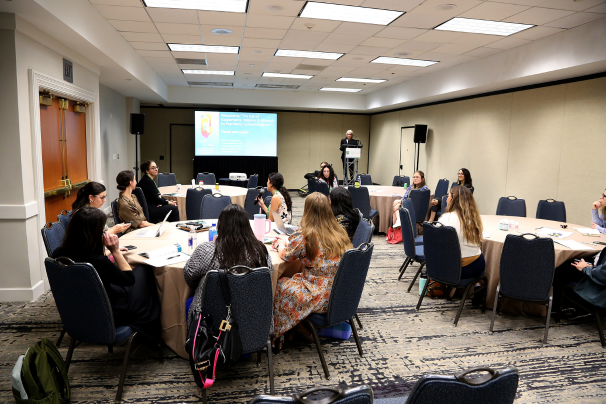CLP 2024 - Thursday: Plenaries | La Cabana | Nutrition | General Sessions | Posters | Welcome Reception | Yesterday
YESTERDAY at the Annual Meeting
How to Bring About Change
Preconference sessions included free courses on current C-L Psychiatry topics; advocacy skills for psychiatric physicians; and an experiential course in reflective writing, creating narratives to promote whole health.
The advocacy skills course introduced two panels of speakers, initially setting out how they started on their advocacy journeys then discussing, for example, how they go about making change by building relationships and collaboration with others, some of whom may have different opinions. Advocacy in groups was regarded as more effective than individually, and having enough time was imperative to creating a case for change: “You can’t just show up with an ask.”
Former AMA president, Patrice Harris, MD, MA, and Kristin Kroeger, APA’s chief of Advocacy, Policy and Practice Advancement, chaired the panels. Each described advocacy work of the AMA and APA where outcomes had been successful, such as APA’s Enactment of Collaborative Care Model legislation in several states. Delegates were encouraged to sign up for the APA’s monthly advocacy update here: advocacy@psych.org
Panellists pictured included E. Lee Tynes, MD, PhD, FACLP, the Academy’s representative at the AMA’s House of Delegates.
One panellist, Anna Ratzcliff, MD, PhD, described how some clinicians experienced what she called ‘moral distress’ when they did not know the skillsets to make change, often within their own institutional practices, which could lead to them quitting their posts.
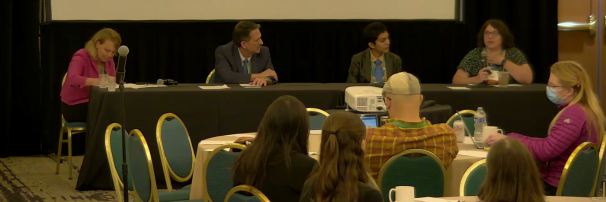
One of the panels of speakers at the advocacy skills course, from left, chair Kristin Kroeger; E. Lee Tynes, MD, PhD, FACLP; Fi Fonseca, MBBChBAO, MS; and Anna Ratzcliff, MD, PhD.
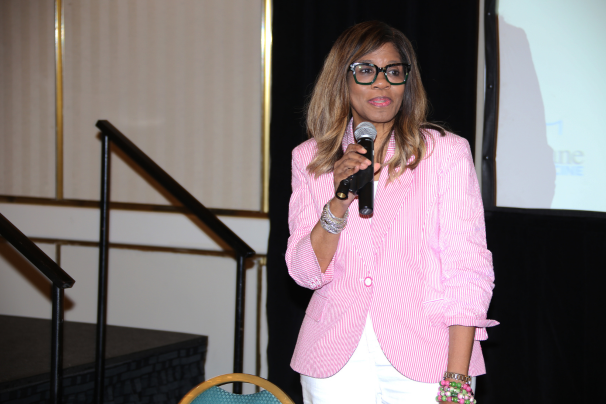
Patrice Harris, MD, MA.
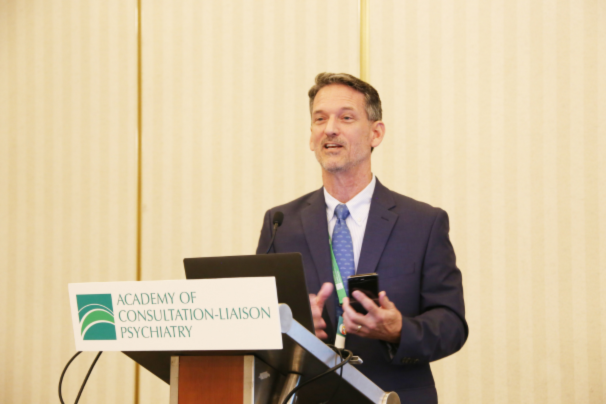
E. Lee Tynes, MD, PhD, FACLP
Other preconference courses included Coaching the Leader Within: Connecting Your WHY, Empowering your Strengths, and Building Your Skills with ICF-trained coachers, past Academy president Maryland Pao, MD, FACLP, and this year’s ACLP Eleanor and Thomas P. Hackett Memorial Award winner, Linda Worley, MD, FACLP. In one session, Illuminating Your Strengths and Gifts, delegates were inspired to shine “like stars in the night sky”. As indeed they did.
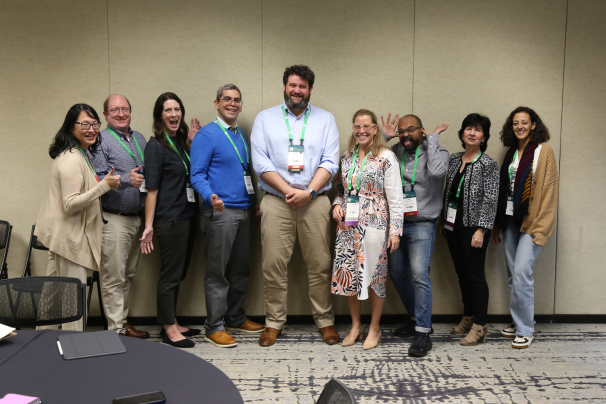
42% of Inpatient C-L Psychiatry Teams Include APPs
Preconference sessions included a half-day skills course for Advanced Practice Providers (APPs) which attracted more than 70 pre-registrations—among them physicians, nurse practitioners, physician assistants, and trainees.
Course topics included antipsychotics and medication safety; psycho-oncology; and challenging interpersonal dynamics.
Pictured (below) is the opening speaker, Adrienne Miskin, MD, MPH, MS, Columbia University, who discussed neuropsychiatric side-effects of cancer treatments, in particular chemotherapy, radiation, and steroids.
APPs constitute much of the national C-L Psychiatry workforce. A 2022 survey by course organisers, ACLP’s Interdisciplinary Education Subcommittee, showed 42% of inpatient C-L teams include APPs.
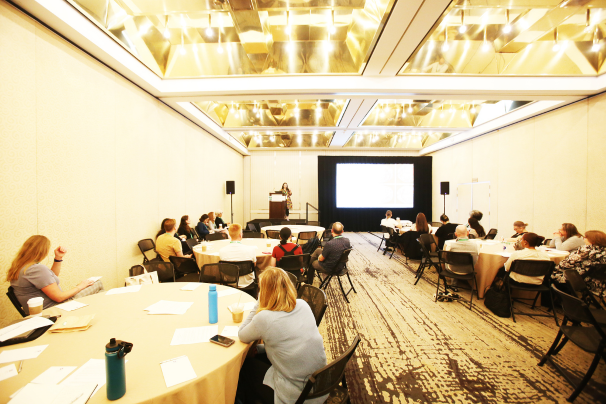
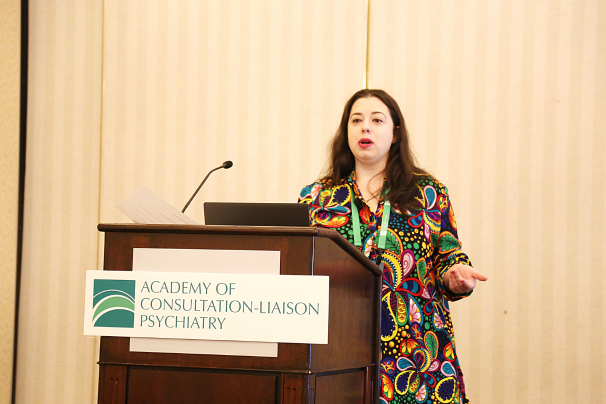
Creating Successful Research Careers
The full-day ACLP Developing Scholarship and Research Colloquium aimed to enlarge the cadre of C-L psychiatrists possessing skills needed to take scientific investigations from initial ideas to completed projects. It was geared towards participants building program development or research careers, including those who are seeking to incorporate research into their clinical careers.
The colloquium began with general sessions on creating successful research careers, followed by smaller, interactive sessions and workshops for developing scholars in three tracks: Independent Investigators; primary clinicians engaged in research; and clinicians and educational program developers.
A line-up of 14 distinguished speakers was arranged by the ACLP Research Subcommittee.
How Hypnosis Works
With the help of a volunteer from the audience, Philip Muskin, MD, MA, LFACLP (pictured below), demonstrated what hypnosis is—and how clinicians can use hypnosis working with patients—to open a course on hypnosis and mindfulness for C-L psychiatrists treating anxiety and pain. A central component of hypnosis is being able to focus exclusively on one particular thing.
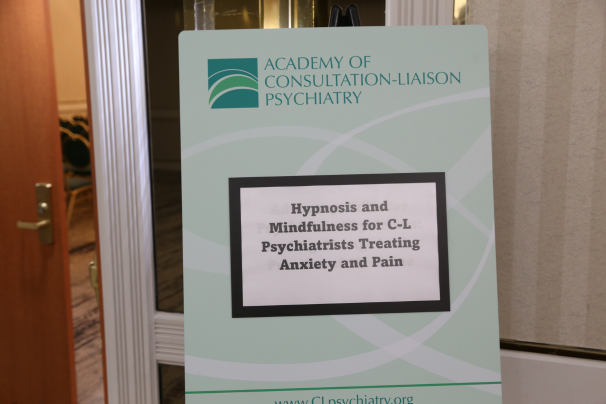
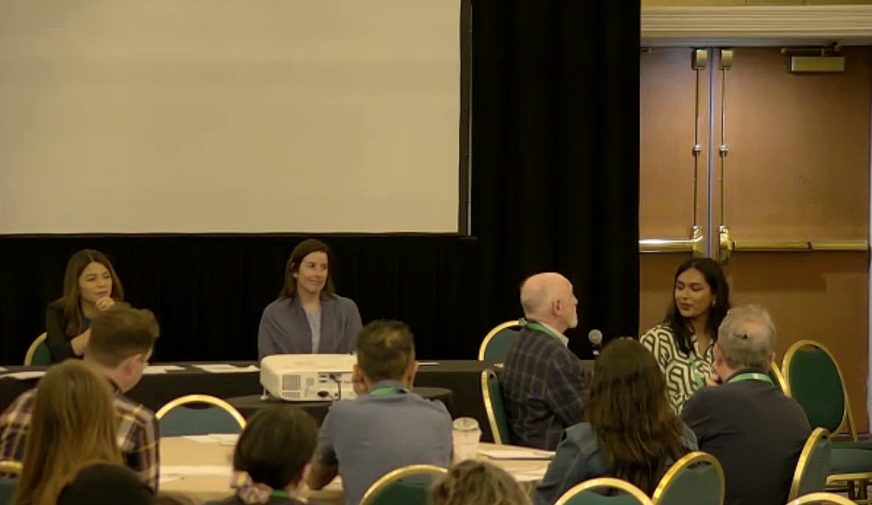
Basic Understanding of Neuroradiology
The What am I Looking At? course introduced neuroradiology to C-L psychiatrists—showing how to read neuro-imaging to make clinical correlations.
Speakers advocated that C-L psychiatrists must have a working knowledge of neurology, think through medical, neurological, and psychiatric differential diagnoses, and make useful, specific recommendations.
Given the centrality of imaging in modern medicine, they advocated that a basic understanding of neuroradiology—what to order and knowing what you’re looking at—is an important skill for C-L psychiatrists.
The course covered four main topics: Introduction to radiology; basic neuroanatomy in brain MRI; imaging findings and clinical correlations in strokes; and neuropsychiatric symptoms and associated imaging findings.
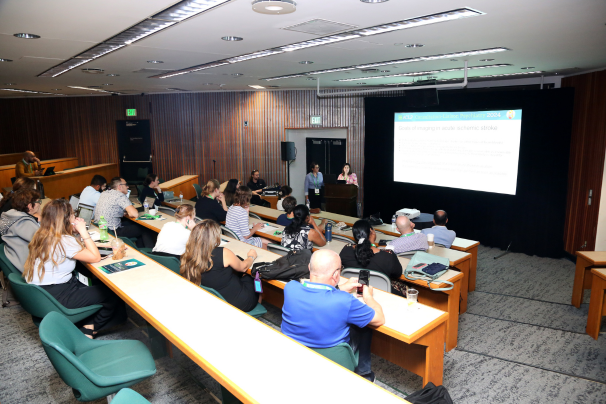
Overview of Herbs and Supplements
The preconference session on supplements and vitamins provided an overview of several herbs and supplements offered in the treatment of psychiatric disorders, with focus on quality of evidence, strength of impact, and appropriate dosage, mostly for the treatment of depression and anxiety.
Substances covered included omega 3s, St John’s Wort, lavender, saffron, curcumin, sam-E, inositol, and rhodiola—loosely listed by the speakers for efficacy and quality of evidence.
The nutraceutical and supplement industry increasingly attracts patients looking for more natural ways to address their mental health challenges.
